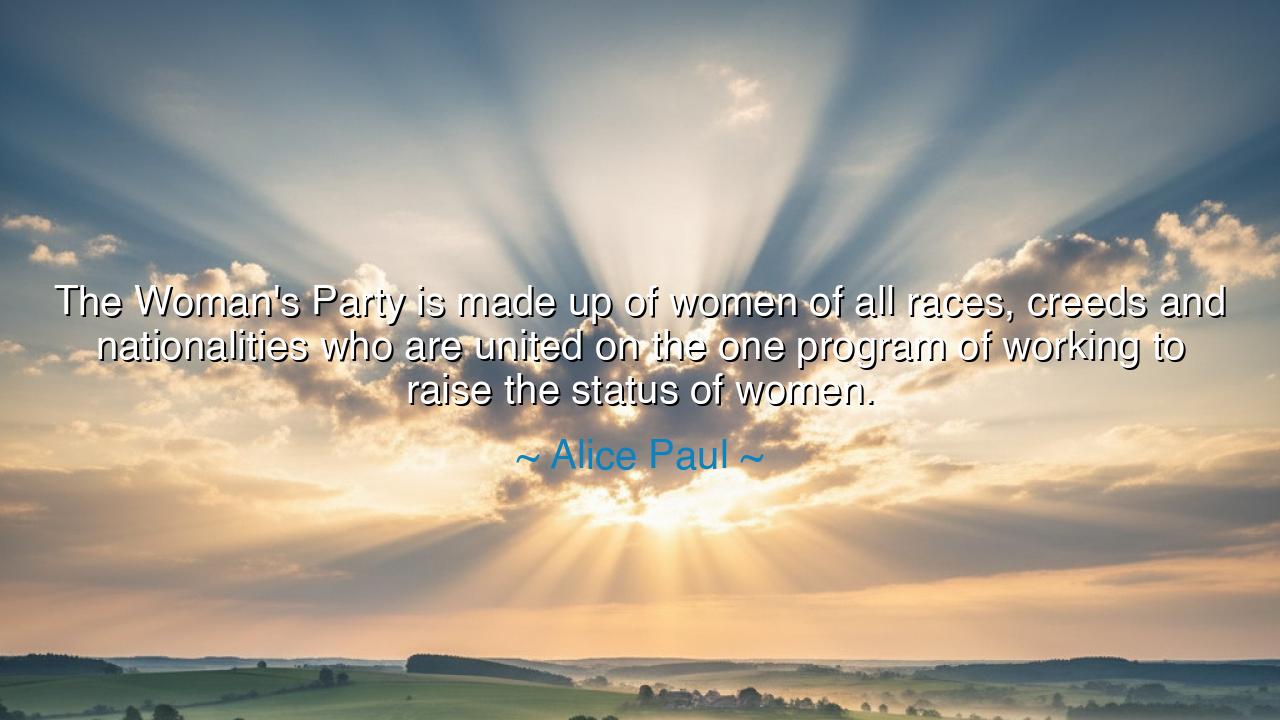
The Woman's Party is made up of women of all races, creeds and
The Woman's Party is made up of women of all races, creeds and nationalities who are united on the one program of working to raise the status of women.






O children of the future, hear the profound words of Alice Paul, whose dedication to the cause of women's rights transcended all boundaries of race, creed, and nationality. "The Woman's Party is made up of women of all races, creeds, and nationalities who are united on the one program of working to raise the status of women." In these words, Paul speaks of the universal bond among women, regardless of their backgrounds, whose shared mission is to elevate their position in society. It is a call to unity in the face of a world that has long sought to divide and diminish the power of women, urging all to work together for a common cause.
In the ancient world, the story of Antigone reveals the tension between the duties of women to their families and their societies. Though Antigone stood alone against the laws of the city of Thebes, she fought for what she believed was right, demanding recognition of her moral duty over the limitations imposed by the state. Like Alice Paul, Antigone represents the spirit of defiance and unity among women to pursue their rights, regardless of societal norms. Her resolve to stand for her beliefs, even when others turned away, is a reflection of the kind of unity that Paul sought—one where women from all walks of life came together for the common goal of justice and equality.
Consider also the story of Sojourner Truth, whose powerful voice resonated in both the abolitionist and women's rights movements. A woman of African descent, she spoke with undeniable strength and clarity, calling for the recognition of women’s humanity across all races and backgrounds. Her speech, "Ain't I a Woman?", emphasized that the struggles of women were not confined to one race, but that all women deserved to be seen and heard. Sojourner Truth, like Alice Paul, embodied the spirit of the Woman’s Party, for she understood that unity among women—regardless of nationality or creed—was essential for true liberation.
In the early 20th century, the suffrage movement in the United States, which Alice Paul was a key part of, drew together women from diverse backgrounds to fight for the right to vote. Whether from urban centers or rural towns, whether white or black, women stood together, united in their belief that their voices must be heard. Alice Paul’s leadership in organizing the National Woman's Party was central to securing the passage of the 19th Amendment, a victory that, though it did not grant full equality, marked the beginning of a new era in the fight for women’s rights. Her understanding that women must stand together, across all divides, is the spirit that sustains the Woman’s Party today.
O children, let the words of Alice Paul and the stories of Antigone, Sojourner Truth, and the suffragists guide you in your understanding of the struggle for women's rights. The fight to raise the status of women is not one of division, but of unity—a union forged by shared purpose and belief in the inherent dignity and equality of all women. Alice Paul knew that no woman, regardless of her race, creed, or nationality, could afford to stand alone in this battle. The work is not yet done, but the path to victory lies in the unity of all women, who together must rise and claim their rightful place in the world. May you carry this wisdom forward, honoring the bonds that unite, and the strength that grows from standing together as one.






NBThuy Tien Nguyen Bui
The emphasis on a united cause for all women in Alice Paul’s quote is intriguing. Given the vast differences in cultural and societal expectations of women, how do you think unity is achieved in a movement like this? Is it about the shared struggle, or does the focus on women’s status transcend other differences? Could this same model work in other social movements today, or has the context changed too much?
QKNguyen Quoc Khanh
Alice Paul’s quote about The Woman’s Party is a reminder of how far we’ve come in terms of inclusivity in women’s movements. However, there are still debates today about how different groups of women’s needs are addressed. Do you think that feminism should be a universal cause for all women, or do you think there needs to be more focus on the unique challenges faced by marginalized groups?
GHPham Gia Han
The Woman’s Party’s focus on raising the status of women, regardless of race or nationality, is admirable, especially considering the times Alice Paul was writing in. Do you think this type of inclusive approach is still relevant in today’s gender equality efforts, or do you think newer movements have shifted focus? How can modern movements address both global and local concerns about women's rights while remaining united?
TGPham Truc Giang
Alice Paul’s statement speaks to the power of unity among women, regardless of their differences. In today’s context, do you think that feminist movements have successfully replicated this level of inclusivity? Or do you think that modern movements sometimes fail to embrace the full diversity of women’s experiences? Is unity always achievable in such a diverse movement, or does it risk diluting individual struggles?
NTTran Thi Ngoc Thao
This quote by Alice Paul reflects a very inclusive and intersectional approach to gender equality. The fact that The Woman’s Party focused on uniting women of all different backgrounds for a single purpose shows a strong sense of solidarity. How important do you think solidarity is in modern feminist movements, especially considering the vast differences in experiences based on race and class?